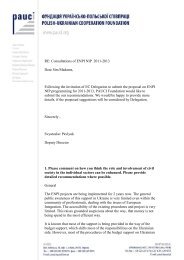Untitled
Untitled
Untitled
Create successful ePaper yourself
Turn your PDF publications into a flip-book with our unique Google optimized e-Paper software.
2. “Prospect of Membership” Problem<br />
Today the Ukrainian diplomacy attempts to win the EU’s consent to define in NEA the<br />
possibility of getting the EU membership in the future. The highest possible achievement<br />
would be to mention in the NEA’s preamble that “the final goal of Ukraine is the<br />
acquisition of membership in the European Union” and that “in the Parties’ opinion, this<br />
association will assist in attaining this goal” (as mentioned in European agreements<br />
concluded with post-socialist countries of Eastern Europe in 1990s).<br />
At present, EU refuses to consider the issue of possible Ukraine’s membership. Just in<br />
this context there are interpreted directives of the EU Council for negotiating delegation<br />
of the European party 8 , in particular, that “a new enhanced agreement should not<br />
prejudge any possible future developments in EU-Ukraine relations” 9 . EU officials also<br />
put emphasis on the “neighbor” status of Ukraine within European Neighborhood Policy<br />
(ENP) that embraces countries having no membership prospects.<br />
The complexity of this task requires from the Ukrainian party to give a clear answer to<br />
what the inclusion in NEA of the clause on the Ukraine’s prospect of membership may<br />
result in and to what it may not bring basically. Answers to these questions lie in two<br />
planes – legal and political.<br />
The grounds and procedure for EU accession shall be regulated exclusively by Article<br />
49 of the Treaty on European Union (TEU), and neither EU international treaty may<br />
change them. This Article shows that the European Union or its member states are not<br />
entrusted with legal responsibility to grant the accession application submitted by any<br />
country. So, the country has no legal right to membership even if it fully meets all<br />
established criteria and even if EU has already sometime contemplated its membership<br />
in the international agreement.<br />
Hence, the EU accession primarily depends on the decision of member states and their<br />
political will where political expediency logic works. So, the possibilities that may be<br />
given by the NEA’s provisions on the Ukraine’s prospect of the EU membership should<br />
be scrutinized just in this context.<br />
First of all, the fact of mentioning the prospect of membership has to decrease the risk<br />
that examination of the “Ukrainian matter” in EU institutions be hampered with reference<br />
to the complexity of the EU decision-making procedure. It is also necessary to<br />
rely on the changes to the internal structure of EU-Ukraine cooperation, i.e. on increasing<br />
volume of financial assistance, more active engagement of EU institutions in the<br />
initiation of reforms by Ukraine, etc. Besides, this provision should bring changes to<br />
the impression made by Ukraine not only on the EU political elite but also on wide social<br />
circles as well as have strong impact on the domestic political life of Ukraine and<br />
its geopolitical priorities. And finally, availability or unavailability of such provision will<br />
specify the NEA substance, in particular, the depth of integration to be achieved by the<br />
parties as a result of performance thereof.<br />
Most likely, it is to be expected that EU will keep on refusing from consideration of the<br />
Ukraine’s prospect of membership. This position is based on some key theses illustrating<br />
today’s EU attitude to Ukraine. A lot of efforts should be made to prevent from mirroring<br />
such postulates in NEA.<br />
8 See point 2 of Conclusions of the Council regarding Negotiations on New Enhanced Agreement between EC and Ukraine<br />
dated January 22, 2007 approved at the 2776 meeting of the EC Council on foreign relations.<br />
9 English version “a new enhanced agreement should not prejudge any possible future developments in EC-Ukraine relations”,<br />
French version “un nouvel accord renforce ne prejudge pas de evolution future des relations entre l’UE et l’Ukraine”.<br />
K A S P O L I C Y P A P E R 8<br />
11 / 28



